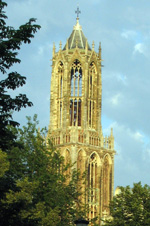Washington University School of Law is launching a Transnational Law Program, a first-of-its-kind offering for students in both the United States and Europe.
This program expands upon the law school’s ongoing partnership with Utrecht University in the Netherlands.

Beginning in fall 2008, a new four-year combined degree program will be offered in association with four prestigious European universities: Utrecht University, Queen’s University Belfast, University of Trento-Italy and Catholic University of Portugal.
The new Transnational Law Program allows U.S. students to study at both WUSTL law school and Utrecht University. Initially, these students will spend five semesters acquiring a solid foundation in U.S. law with an emphasis on international and transnational law from an American perspective.
They will then undertake three semesters of study in Utrecht, acquiring an appreciation for European law and enhancing their understanding of international and transnational law. Faculty and students from the other three European partners will contribute to the strength of the program.
Upon completion, the U.S. graduates will earn a J.D. from WUSTL School of Law and an LL.M. from Utrecht School of Law. European participants will pursue a complementary course of study; after earning their degree from Utrecht, they will enter the LL.M. program here.
“There is a growing need for lawyers who understand both American and European law, who can identify legal issues and know reliable sources in the U.S. and throughout Europe,” said Kent D. Syverud, J.D., dean of the School of Law and the Ethan A.H. Shepley University Professor. “Many American law schools are expanding their international curricula and study-abroad programs. Washington University law and Utrecht University are now taking international legal education to the next level.”
Unlike traditional international dual-degree programs, WUSTL’s transnational law program will be the first to offer:
• a targeted, integrated curriculum developed with partner institutions;
• internships with U.S. and European corporations, law firms, courts, enforcement and administrative agencies and non-governmental organizations;
• ongoing faculty exchanges among the participating schools;
• related courses co-taught by partner and University faculty.
On Tuesday, Feb. 26, leaders from each of the partner universities will gather to officially launch the program and participate in a round table discussion on transnational law.
The event, held from noon to 1 p.m. in the Bryan Cave Moot Courtroom of Anheuser-Busch Hall, is open to the public and eligible for one Missouri Continuing Education Legal credit.
The transnational law program will prepare students to enter and ultimately assume leadership in the expanding areas of international and transnational law, said Michael Peil, J.D., assistant dean for international programs and executive director of the law school’s Whitney R. Harris World Law Institute.
“We are excited to offer this unique new program that will benefit both our students and faculty and students and faculty at our partner schools,” Peil said. “The integrated aspect of the curriculum makes it unlike any other offering at our peer institutions. Both our American and European graduates will be prepared for rewarding professional lives in an increasingly globalized world.”
Dorsey D. Ellis Jr., J.D., the William R. Orthwein Distinguished Professor of Law and chair of the program’s faculty advisory committee, noted: “While program graduates will receive degrees in both Europe and the United States, their education will be more than the sum of these two systems.
“The transnational law program’s focus reflects the new reality of a legal environment that transcends national boundaries. Financial and commercial transactions, for example, cross borders every minute of every day; environmental impacts know no national borders, and family law cases as well as criminal prosecutions increasingly exhibit transnational dimensions.
“Law firms, businesses, government agencies and nongovernment organizations have a growing need for lawyers trained in transnational systems,” he said.
Charles Burson, J.D., retired executive vice president and general counsel at Monsanto Co. and a member of the law school’s National Council, said the program will help train law students for the demands of international business.
“This bold program provides law students a platform from which to launch into the new reality of our global market. Participation in the program will open up new and exciting opportunities for students, to the benefit of their future employers and clients,” said Burson, who is of counsel at Bryan Cave LLP in St. Louis and a visiting professor of law.
Similarly, Thomas Lowther, J.D., National Council member and partner at the Stolar Partnership in St. Louis, said: “In today’s shrinking world, any lawyer with a commercial practice will sooner or later encounter an international trans-action.
“The power of this program is that it exposes students to legal systems that differ from ours, making them more alert to legal issues in cross-border transactions,” he said.
Adriaan Dorresteijn, dean of University College at Utrecht, said the program is a natural fit: “This unique program builds upon our very successful partnership with Washington University School of Law, including the Summer Institute for Global Justice and other faculty and student exchanges.
“The new degree program addresses an obvious need for students and faculty at both universities,” he said.
Leila Nadya Sadat, J.D., the Henry H. Oberschelp Professor of Law and director of the Harris Institute, launched the highly popular summer program in Utrecht in 2005.
Focusing on international justice, this program draws distinguished faculty and students from around the world.